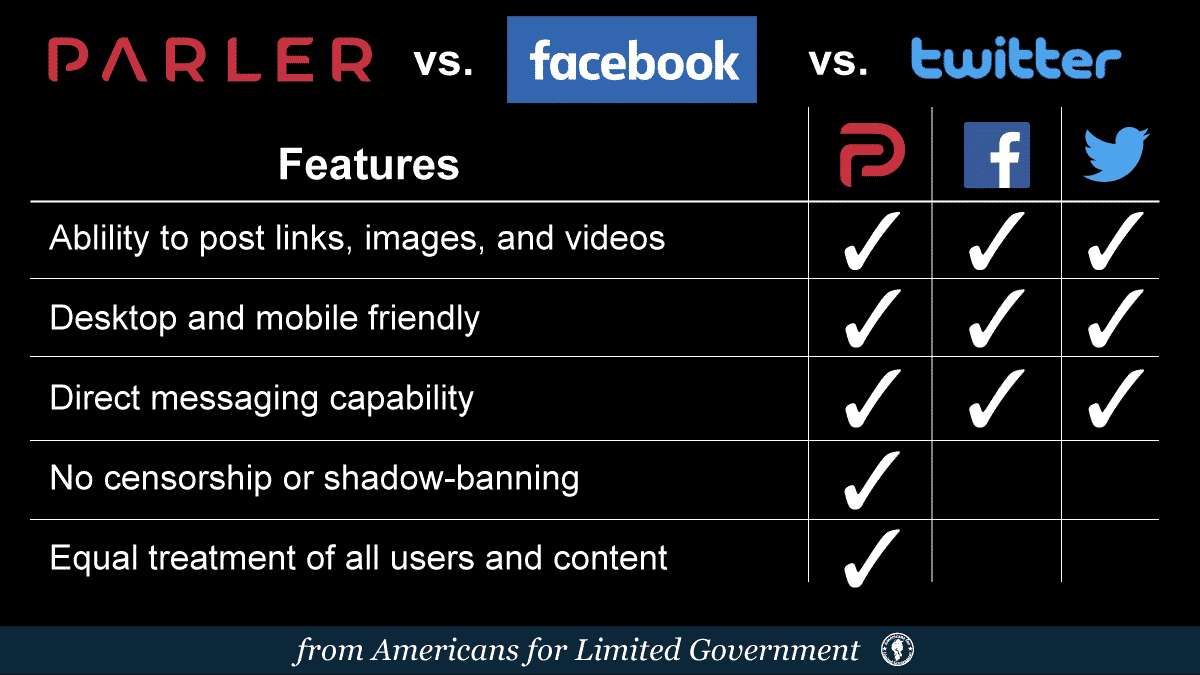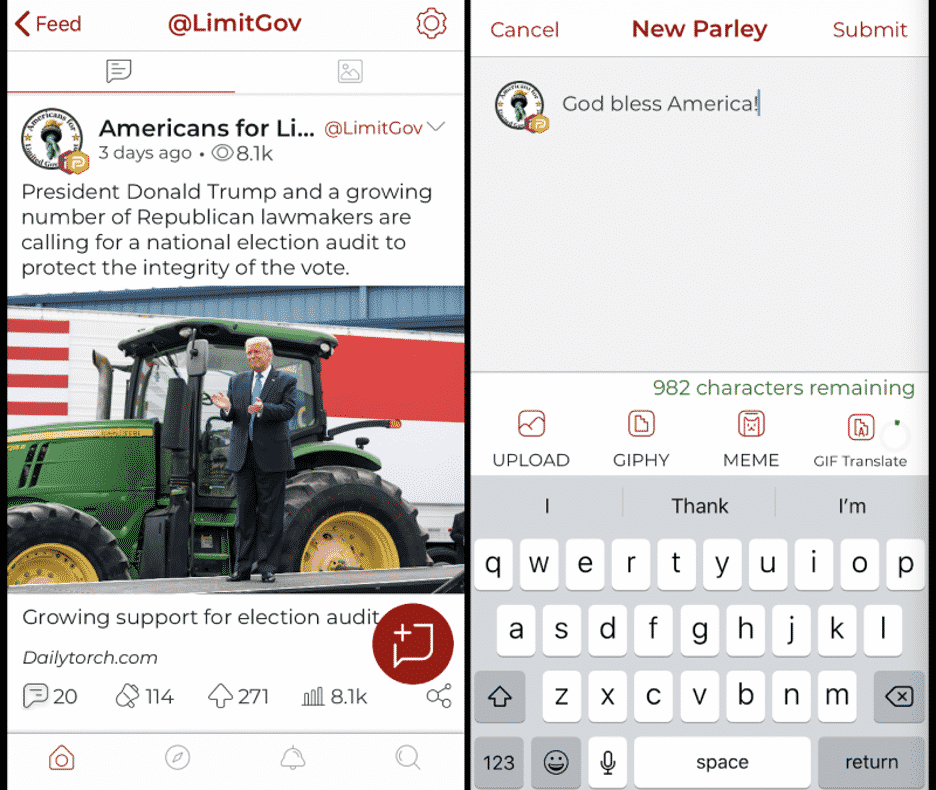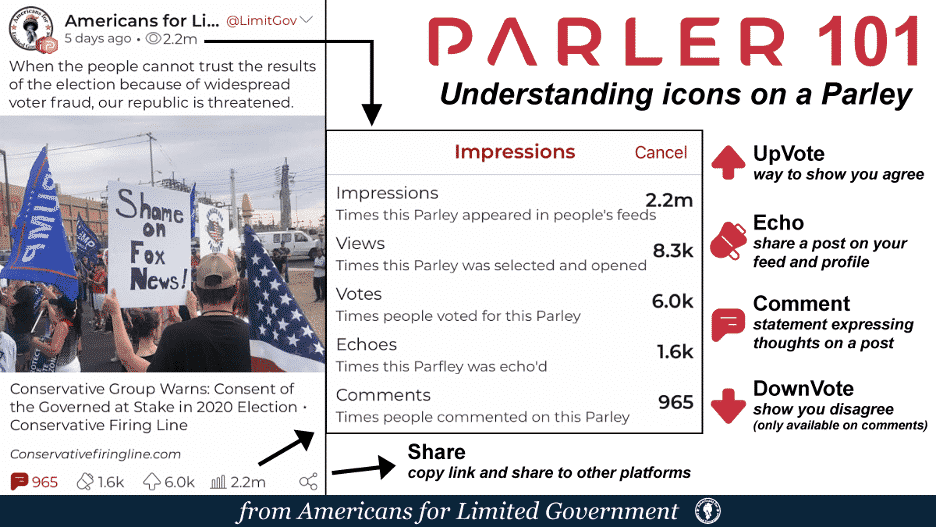
Are you tired of Big Tech deciding what posts you see on social media? Do you feel anxious posting your political opinions online? Do you wish you could exercise your right to free speech without worrying about political correctness or being “cancelled”?
If you answered yes to any of these questions, Parler may be the best thing to happen to you in 2020! It’s been a year, we all need some good news, so please read on.
Tip 1: Understand Parler’s Perks
Parler is a growing social media platform that focuses on free speech. Since the election, Parler has experienced explosive growth with nearly 5 million new users in just the last couple of weeks. A letter from CEO John Matze to the Parler community explained the company is working on performance improvements to accommodate its growth and create an optimal user experience.
While offering similar perks as other popular social media, Parler is unique because it doesn’t censor or use complex algorithms to dictate which content you see in your feed.
Here’s how Parler compares to Facebook and Twitter:

Parler respects the rights and liberties of all of their users. Unlike their competitors, Parler’s values emphasize freedom and transparency. They’ve built a trusting relationship with their users through upholding their Community Guidelines, Privacy Policy, and User Agreement, all of which are easily found on their website.
If you haven’t already, go to Parler.com or download the app to create an account. Once you’ve created an account, you can easily update your profile and find people to follow. I recommend following @Parler and @ParlerSupport because they post important updates and useful information for your Parler experience. Also of course, don’t forget to follow Americans for Limited Government (@LimitGov) and myself (@MeganMarzzacco).
Tip 2: How to Post on Parler aka. how to Parley
A post on Twitter is called a tweet. A post on Parler is called a Parley /par-lay/. Just think of this rhyme, “Yay, time to parley!” It sounds like yay time to party, which fits the vibe and is the mindset you should have when using the app.
On the mobile app, you can post on Parler by tapping the Parler symbol in the bottom right corner. Then you can type your post and add any links, pictures, videos, GIFs, and memes. A parley can have up to 1000 characters, and it lets you know how many you have remaining as you craft your parley.

Now you can parley to your heart’s content!
Tip 3: How to Engage with Parleys From Others and Understand Your Own
Parley’s from people you follow will appear in your home feed. When scrolling through your feed you can comment, echo, upvote, and share parleys. Commenting allows you to share your thoughts and opinions on parleys. Echo-ing allows you to share the post with your followers (similar to retweeting if you’re a Twitter user). You can also echo with a comment, which allows you to share the post and your thoughts on it with your followers. Up-voting is a way to show your approval and agreement. See the graphic I created below to see what each of these look like.
You’ll also notice a small eye symbol at the top of the post just under the username. This symbol is for impressions, which tell you how many times the parley appeared in people’s feeds. You can see this on any parley. For your own parleys you can click the graph to the right of the upvote button to see more details on engagement, such as the number of impressions, views, votes, echoes, and comments. This information is only available in the app, so if you’re a social media manager like myself and you post most parleys from your desktop, make sure you’re checking the app to see these details! The desktop version shows you the eye symbol with impressions, but the breakdown of views, votes, echoes, and comments can only be viewed by clicking the graph in the app.
Here’s an infographic to illustrate what this looks like using one of our top performing parleys as an example.

You can also click “show conversation” at the bottom of a parley and read other people’s comments. You can respond to comments, upvote, or downvote them. Down-voting is a way to show you disagree with someone’s comment, and down-voting can only be done on comments, not parleys. You can also share parley’s with people not on the app by clicking the share button in the bottom right corner of the parley.
Although Parler offers similar features to other social media, it’s on the rise as a freedom-friendly alternative to agenda-driven Big Tech companies.
As conservatives, we need to be authentic and courageous in sharing our beliefs face-to-face and online. One of my favorite things about Parler is the freedom to post and interact with a community that doesn’t try to cancel you. We still need to be brave on every social media, but it is very refreshing to finally have a platform where you don’t have to worry about censorship. Since Parler is still relatively new and mostly used by conservatives and libertarians, it’s also a sweet relief to parley without anxiety that a liberal friend or family member could attack you with Facebook comments or a long Twitter thread.
Whether you’re outspoken or shyer conservative online and in real life, remember we’re on the right side of history and we must stay strong in the face of adversity. Never let anyone try to take away your freedom or make you feel like your voice doesn’t matter, especially a “tolerant” leftist who only cares about your politics and not your personhood.
Big Tech and the far Left will try to intimidate and outnumber us, but we’re the “silent majority” that needs to speak up! We don’t have time for their negativity and we can’t stay silent forever. The clock is ticking, and we have a country to save!
Let us know if you found this intro to Parler helpful, and we’d be happy to publish more tips and tricks! If you’re on Parler, be sure to follow us @LimitGov and me @MeganMarzzacco
Megan Marzzacco is a contributing editor at Americans for Limited Government.






